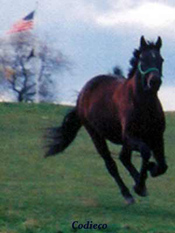
Horse Slaughter
Horse Cruelty
Horse Rescue
Legislation
Stolen Horses
Press
General
SiteMap
Horse Cruelty Info
PA Anti-Cruelty Law
Title 18, Section 5511
Henneke Body Scoring Condition Chart
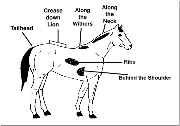
The Henneke Body Scoring Chart is accepted in court as a scientific method of scoring a horse's body condition. It is used successfully in court to prove neglect.
Investigating Cruelty
Successful Enforcement

PA State Police arrest horse dealer at PA horse auction
PA State Police Enforce
PA Anti-Cruelty Law at New Holland, PA Auction
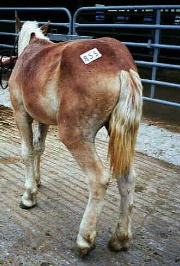
Young draft gelding shipped from NC displays injured left hind leg. A PA equine vet determined that there was no fixing this horse's injured leg. He was humanely euthanised.
No Enforcement
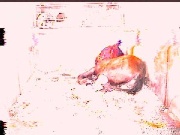
Down and bleeding inside a trailer with Maine license plates at a New Holland, PA auction. Reportedly the horse later died. No charges were ever filed. Blood was pooling on the ground under and outside the trailer.
The Downer Hall of Shame

Down Belgian was down all day at a PA horse auction. Several bystanders attempted to get the horse to rise. A vet was never called...
The Labor Day Mares
Severely foundered mare's face reveals the pain she is feeling. Mare was found down on a truck at a New Holland auction. Blood oozed from her coronary bands.
A Mule & 2 Standardbreds-
All Had Broken Legs & were Hidden on A Traile
r
No Water

Water tank is empty, even though the faucets work..
The Horse the Killers Refused & the vet passed.
Unfit Horses Sold at Auction
PSPCA allows sale - NHPD files charges, owner pleads guilty.
Links
California Voters "Just Say Neigh" to Horse Slaughter!
HoofPAC
Shop online at IGive.com with over 400 great stores you know & love- including Back In the Saddle! Up to 26% of the purchase price is donated to the EPN!
Join today!The EPN gets $5 extra the first time you shop!
PayPal accepts credit cards! Please send your tax deductible donation to the:Equine Protection Network, Inc.,
P. O. Box 232, Friedensburg, PA, 17933.
HoofPAC is the political action committee that has been formed to end the slaughter of America's horses. Cathleen Doyle, founder of HoofPAC, led the successful Save The Horses campaign in 1998 that made the slaughter of California's horses a felony.

Horse Cruelty - No Water
Tied in the 90 degree heat on concrete in the sun from mid morning to late afternoon with no water...
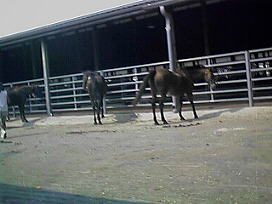
September 1998
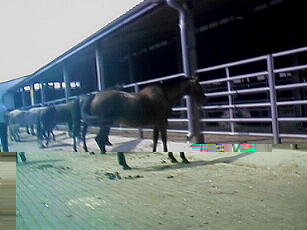
Water buckets can be carried to these horses, there is water service to the auction.
Buckets are not that expensive.
For years the public complained to the auction management and humane agents regarding the lack of water provided to the horses. The auction chose to ignore those complaints and called the people who complained, "animal rights activists".
News reporters who came to the auction were shown the dry water tanks. The hydrants that supplied the water tanks worked. When turned on the water flowed, and the horses drank. The reporters asked the obvious question,
"Why won't they give the horses water?"
We suggested they ask the auction. All the tanks needed were drain plugs.
Not until the PA State Police came to the auction in July 1998 did the auction make any attempt to offer water. Then the horses were tied in the back pens with hay and full water tanks. Yet because the horses were tied they were unable to access the water tank. The public was also denied access to those pens.
The horses that are tied in the courtyard all day still do not have any water. The horses tied in the killer pens still do not have access to water.
The auction has made it more difficult to document the conditions. That does not mean that the conditions have improved.
The following is quoted from Penn State Cooperative Extension .
Extension is an arm of the land-grant university and is funded cooperatively by the U.S. Department of Agriculture and state and county governments.
Equine Feeding Management
Patricia Comerford and Virginia Ishler
" 2. Fresh, clean water should be provided free-choice. Horses prefer water temperatures between 45 and 65 Fahrenheit. Estimated water intake for a mature idle horse is from 5 to 10 gallons per day, compared with 10 to 15 gallons per day for working, gestating, or lactating horses. Water intake, like forages and grains, is influenced by environmental temperature, level of activity, stage of production, and type of feed.
Working horses need adequate water to replace body fluids lost in sweat, especially during hot, humid weather. Horses should be allowed to drink small amounts regularly, while working or exercising, to prevent dehydration."
From Penn State's College of Agricultural Sciences 1994
AGRICULTURAL ALTERNATIVES: Boarding Horses
Fresh water should be available to horses at all times, and should be free of dirt, algae, and food particles. In the winter it is very important to keep water from freezing or to break up ice on the surface.
Serious health problems can quickly develop if a horse's water intake is reduced.
December 1997

Excerpts From the Horsemen's Advisor:
NUTRITION FOR THE MATURE AND OLDER HORSE
by Robert N Oglesby DVMWATER
" Water is the most important nutrient. Clean water should be available at all times. It should be noted that horses can be particular about what they drink; old, dirty, or unusual smelling water may not be touched. "
Excerpts from The Horsemen's Advisor:
Water, Electrolytes, and Riding in the Heat
by Robert N. Oglesby DVM"Heat is not the only problem the horse has to deal with when exercised during hot humid weather. Alterations in body fluids and electrolytes (salts) can cause serious illness.
There are no body stores of water or electrolytes with the exception of what the horse has in its digestive tract. Any excess absorbed is rapidly excreted. Thus water and electrolyte deficits cannot be prevented by giving them before they are lost.
The gastrointestinal tract contains a amount of water and electrolytes equal to 6 to 10 % of the horses body weight. "
Excerpts from The Horsemen's Advisor:
Summertime Care of the Horseby Robert N. Oglesby DVM
"A salt block should be available and clean water at all times."
Save America's Horses!Save America's Horses- Make the Commitment to Your Horse!
|
|||||||
